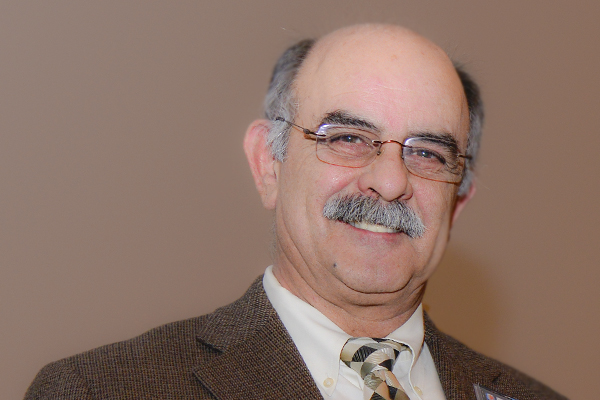I attended the lecture by USF Health Research Day speaker Dr. James W. Simpkins, because I was intrigued by the title of his talk: “Wandering in Neurodegeneration Research: A Career of Running Against the Wind.”
I expected to hear some interesting things about neuroscience related to brain disorders of aging, because that’s the expertise of Dr. Simpkins, director of the Center for Basic and Translational Stroke Research at West Virgina University.
I wasn’t disappointed.
USF Health Research Day 2014 speaker Dr. James Simpkins wove lessons he’s learned about
the politics of science into the discussion of his research on brain disorders of aging.
Dr. Simpkins recapped his years of preclinical research looking at estrogen’s capacity to protect against neurodegeneration – a course he stayed because the evidence was strong — even when news from the federally-funded Women’s Health Initiative (which did not initially report the trial findings stratified by age) created a commotion about the use of estrogen therapy in postmenopausal women.
He discussed the search for selective compounds containing estrogen that could protect nerve cells against diseases like Alzheimer’s or stroke without the risk of cancer associated with the use of estrogen. And he talked about his team’s latest study — investigating the molecular mechanisms that might help explain why a significant percentage of strokes are preceded by infections.
But, what I found even more interesting was the advice and observations he shared with the enthusiastic young student scientists in the room, gleaned from his career of, well, running against the wind. Here’s a few lessons he says he’s learned about the politics of science along the way:
– Associate with really smart people (smarter than you).
– Your inspirations will come unexpectedly.
– Scientific agendas set by bureaucrats are almost always bad.
– The data are usually right and our biases are often wrong.
– Your contribution to an area of research may be underappreciated or ignored (keep moving forward).
The kicker, though, was this: “We are witnessing the decline of U.S biomedical research.”
Federal funding for biomedical research has remained flat since 2003, Dr, Simpkins said, which has ultimately slowed the pace of scientific advancement nationwide.
That means fewer NIH grants funded; fewer positions for faculty, postdoctoral fellows, and, in some places, even graduate students; and delays in infrastructure upgrades, he said. “Part of the problem is that we don’t hang in the same circles as those who make decisions affecting biomedical research.”
Dr. Simpkins concluded by urging all the senior, junior and aspiring scientists in the audience to “tell the story of biomedical research and its struggle” to congressional representatives, legislative aides, potential donors and anyone else with the power to influence biomedical research policy and funding.
The story is not all glum.
At USF, there have been bright spots of sustained, even increased, research productivity. University leaders point to our strong focus on translating science and technology from the laboratory to the marketplace along with USF’s strategic success in capturing more private and non-governmental grants and contracts while continuing to aggressively compete for federal and state research dollars.
Last year, USF moved up to 43rd in the National Research Foundation’s ranking of research spending among both public and private universities – a 10-place improvement. The university attained a record $413.6 million in external research funding, more than half of which ($246 million) was generated by USF Health.
In her Research Day welcoming remarks, USF President Judy Genshaft recognized USF Health’s vital role in advancing the university’s research profile across the state, nation and globally.
Paul R. Sanberg, DSc, PhD, USF’s senior vice president for research & innovation, pointed to health sciences contributions leading to new inventions, startup companies and economic growth. For instance, last year USF ranked 15th worldwide among universities producing new U.S. patents – and 41 percent of the 76 new patents awarded to the university came from USF Health faculty members. Also last year, USF Health technologies created a third of the startup companies spun off from the university.
“We looking forward to working with the new USF Health senior vice president, Dr. Charles Lockwood,” Dr. Sanberg said. “He’s a champion for commercialization of intellectual properties and public-private partnerships.”

